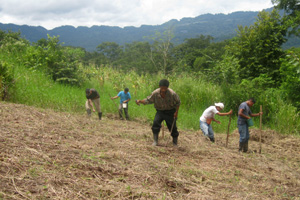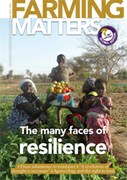After the electoral defeat of the Sandinistas in 1990, former land owners returned to Nicaragua from the USA. They began to take back their former estates through legal and less than legal manoeuvering, driving many rural people off the land they had been cultivating. This ‘agrarian counter-reform’ as it became known, left many hundreds of people landless in its wake during the 1990s and early 2000s. Now a national union has adopted agroecology and is leading the way for peasant farmers to collectively work their way out of poverty and towards a more resilient model of agriculture.

Around Matagalpa in central Nicaragua, coffee plantations spread across the steeply sloping landscape between humid evergreen forests, open pasture and plots of maize, beans and chayotes (christophene). This is also a land that saw war twice in the past 40 years.
First there was the revolutionary war in 1979 when the Sandinista rebels and a broad coalition of social movements ousted three generations of rule by the Somoza dynasty. Second was the bloody Contra war in the 1980s which divided the population along ideological lines, and included the final bullets of the Cold War.
Communities of coffee pickers had much to gain during the period of Sandinista land reform and many hundreds of cooperatives of family farmers were formed, as well as worker-managed coffee processing collectives. But then came the 1990 election and the agrarian counterreform, and a return to abject poverty for many.
Organising the farmers
The Association of Rural Workers (ATC) represents more than 80,000 farm workers in 13 of Nicaragua’s 17 departments and includes many landless and land-poor peasants. Since the 1990s, this association has also included a cooperative branch, the National Agricultural Union of Associated Producers, to help organise thousands of small scale family farmers who combine food production with off-farm work.
Through its participation in the transnational alliance of small farmer organisations that is La Vía Campesina, ATC also became aware of agroecology. They found it a useful and strategic tool for small farmers and their organisations to deepen territorial processes in rural areas and to increase their independence from markets otherwise dominated by transnational corporations. In 2013, the association created an internal National Commission on Agroecology to identify the most suitable methodologies for spreading agroecological practices used by other social movements, adapting them to local contexts and promoting them through their own structures. The commission includes graduates of the Paulo Freire Latin American Institute of Agroecology (IALA-Paulo Freire) in Barinas, Venezuela, a university created by and for rural social movement activists of La Vía Campesina.
Teaching farmers to be teachers
The Association of Rural Workers has the advantage of being a large organisation that includes both cooperatives and farm worker unions, as well as dynamic internal movements of rural women and youth.
The National Commission on Agroecology carried out a process of documentation and analysis (called sistematización in Spanish) of experiences in peasant agroecology from across the country such as nutrient cycling, traditional seed saving, or combining animal production with reforestation.
In doing so, they created a nationwide ‘directory’ of agroecological family farmers – including many who had never considered themselves agroecological or even heard the word before – and prepared the ground for peasant to peasant sharing of agroecological knowledge. Farmers are invited to training courses on the methodology of communication (rather than production techniques). For example, peasant farmers are trained in giving tours of their farms to other peasant farmers, how to explain what they practice and how to share their own experiences. Rather than trying to teach farmers to be farmers, the Association of Rural Workers is teaching them how to be teachers.
This methodology is inspired by the successful Campesino-a-Campesino process used by rural social movements for decades. Positive results have been seen in countries across the world, where agroecology makes the greatest territorial impact when it takes the form of a social movement among smallholder farmers. The protagonists of this movement must be the farmers themselves, including the ATC youth who carry out much of the groundwork and are vital to its development.
Agroecological farmers are the best teachers of agroecology especially when they are teaching to fellow farmers. The role of rural social movements in this setting is to provide the structure (cooperatives, territorial leadership and transportation) as well as the methodology for agroecology to multiply and spread.
Collective committment
Connecting farmers with educational institutes and local food markets is crucial in building a strong movement. In Matagalpa, the Rodolfo Sánchez Cooperative Training Center and Technical School has become a hub for small scale farmers and rural youth interested in agroecology. Workers in nearby coffee estates formed a collective in 2013 to grow food crops such as beans, maize, plantains, taro, yuca and squash on the school grounds, selling plates of fried taro, plantains and gallo pinto (red beans and rice) to students at the technical school on weekends, and using the income to purchase seeds from local suppliers.
Farmers from ATC cooperatives attended workshops on silvopastoral agroforestry systems with the aim of raising dairy cows where access to land was limited. Teach-ins and training on self-esteem and community relations have also attracted youth from nearby communities to spend time in the school. By consolidating this point of attraction in the territorial processes of agroecology, the Association of Rural Workers looks ahead to broader involvement and a deeper movement of popular educators in agroecology.
A rich social mosaic is emerging in Nicaragua, combining experiential educational processes and diversified peasant farms. This role of agroecology, when combined with rural social movements, is to build social and ecological synergies that can create resilience in local and national food systems. Resilient agriculture, necessary for our common future, is growing out of the daily efforts of peasant farmers, rural youth and their organisations.
Nils McCune
Nils McCune works for La Vía Campesina in Nicaragua.
Email: saludcampesina@yahoo.com.mx

